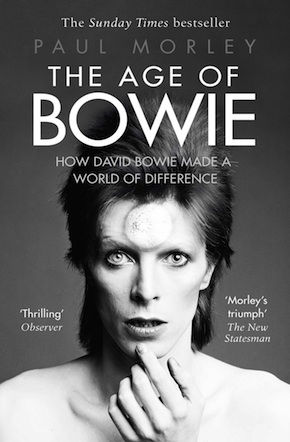Strange fascination
by Paul Morley
“David Bowie did make a world of difference and Paul Morley explains why.” Barney Hoskyns, Observer
The 1970s took their shape from any number of events, tragedies, trivialities, crises, obsessions, conflicts, characters, fashions, inventions, resignations, processes and social and cultural situations. It was a decade of cults, terrorists, protests, scandals, strikes, recessions, environmental panic and a sense of constant crisis. It was also the decade of Bowie. He always had a dispassionate documentary maker’s interest in what was happening around him, so he thrived on the constant tensions and transitions, and channelled it into his music which became both a distorted, dramatic representation of the times, revelling in the unravelling and feeding off its energy, and a way of decoding it, dealing with it, and finding escape routes.
His songs started to become a dismantling, an analysis, a prognostic of social forces and currents that were only just beginning to knock on the door, enacting what Percy Bysshe Shelley claimed as the visionary powers of would-be poets to become the ‘mirrors of the gigantic shadows which futurity casts upon the present’. He did this as a pop star having hit singles and chart-topping albums inside a structured but chaotic business motivated by profit, and by persuading a whole swathe of aimless, searching teenagers to look and dress like him; this was quite a move on from the Beatles and the Stones, but logical, and an essential part of the onward and outward surge of popular culture, towards the day it would become the establishment, and when everyone for better or worse felt it within their constantly photographed and communicated power to act as though they were if not famous then at the centre of not just their own universe but the universe itself.
A star of the 1970s was going to be very different from the stars of the 1960s, and as the ambition of pop and its presence in lives grew, and discriminations and snobberies developed, the best sort of pop star was one who didn’t just entertain and more or less play themselves but one who had greater, stranger pretensions to rearrange, and make better, or at least more tolerable, reality.
In his songs and music, and in how he turned these into mobile, multilayered theatrical productions with their own distinct visual identity, he was doing something powerful and subversive.”
What was remarkable about Bowie in the 1970s as he finally became a pop star – initially by writing a piece of musical theatre about becoming a pop star, and then following that particular script, even as others started to take over the writing and bend him out of shape – was that he could feature in the teen pop magazines, alongside David Cassidy and the Bay City Rollers, and alongside Mud and Slade, as if he were another anodyne sweetheart pin-up built for easily dazzled teenyboppers. But in his songs and music, and in how he turned these into mobile, multilayered theatrical productions with their own distinct visual identity, he was doing something powerful and subversive. He sang about dismay and despair, love as a problem, a complication, sex as a changeable system, but it sounded at first as though he was spreading light and delight. He told us in the most drawn-out, riveting detail that we only had five years left. We didn’t really think he was telling the truth, but then again it was within the realms of possibility, and he sang it like he meant it. If that was the case, he was suggesting, it was necessary to feel things more deeply.
As a writer, who almost couldn’t help but develop and become more sophisticated as he was exposed to new stimuli, new artists and new feelings, he created these expressionist X-rays or photographic negatives of the deeper wellsprings of social and psychological reality. His songs, ostensibly catchy, elegantly arranged variations on standards, torch ballads and smart, loud rock and roll, were tracing and abstracting reality and attempting to portray the deeper motivations that surge below the surface of life. He could deal with a sense of dread that was hanging in the air, a constant sense of apprehension at the edges of our lives, by turning it into something exciting, that both diffused tension and examined it. This difference he had as a pop star could be sensed and felt as a teenager even if not explicitly noticed or understood.
He was tackling truths that could not be represented directly, mapping a rapidly evolving set of new social spaces not yet classified, and creating a series of blueprints that the listener and viewer needed to complete through an application of the blueprint to their own reality.
Like any visionary, he was infinitely interpretable. So everyone had a very different Bowie; for some, a Donny Osmond with added strange, for some a glam-rock idol with added spikiness, for some a primal rock star flying high by using great guitar riffs and determined, fixated rhythms who crashed into a wall when he was twenty-seven and then went off the boil a bit, for some a hypersensitive light entertainer who was amazingly also a socio-historical antenna, for some not their cold, bitter cup of tea at all, and for some a glorious, almost saintly, way of defining their difficult, lonely outsider-ness, tackling their despair at not knowing where they fitted, and resisting the claustrophobic entrapment of a grey, inflexible society.
For that latter group, which would increase in size and scope in the forty years after he first established himself, not least because of the cultural currents he stimulated, Bowie located and, using something as familiar and pleasurable as a melodic pop song, directed people towards an inner space where meaning and values are not pre-given by the norms of society. He was a knight in shining armour – all those plastic costumes, glittering gowns and figure-hugging jumpsuits – protecting the vulnerably different ‘other’ from aggressive incursions into their space by a faceless and remorselessly indifferent society.
He becomes a vivid, active symbol for how the restrictive values of society are not eternal truths but built on a foundation of sand that does and will shift over time. The shakiness of this foundation can be observed – through gaudy entertainment! – and this becomes a provocation to those who rely on an acceptance that the foundations of society are rock solid and correct.
Extracted from The Age of Bowie, out now in paperback, eBook and audio download from Simon & Schuster
 Paul Morley is a writer, broadcaster and cultural critic who has written about music, art and entertainment since the 1970s. A founding member of the electronic collective Art of Noise and on staff at the Royal Academy of Music, his other books include Ask: Chatter of Pop, Nothing, Words and Music: A History of Pop in the Shape of a City, and The North (And Almost Everything In It). He also collaborated with music icon Grace Jones on her memoir, I’ll Never Write My Memoirs.
Paul Morley is a writer, broadcaster and cultural critic who has written about music, art and entertainment since the 1970s. A founding member of the electronic collective Art of Noise and on staff at the Royal Academy of Music, his other books include Ask: Chatter of Pop, Nothing, Words and Music: A History of Pop in the Shape of a City, and The North (And Almost Everything In It). He also collaborated with music icon Grace Jones on her memoir, I’ll Never Write My Memoirs.
Read more

